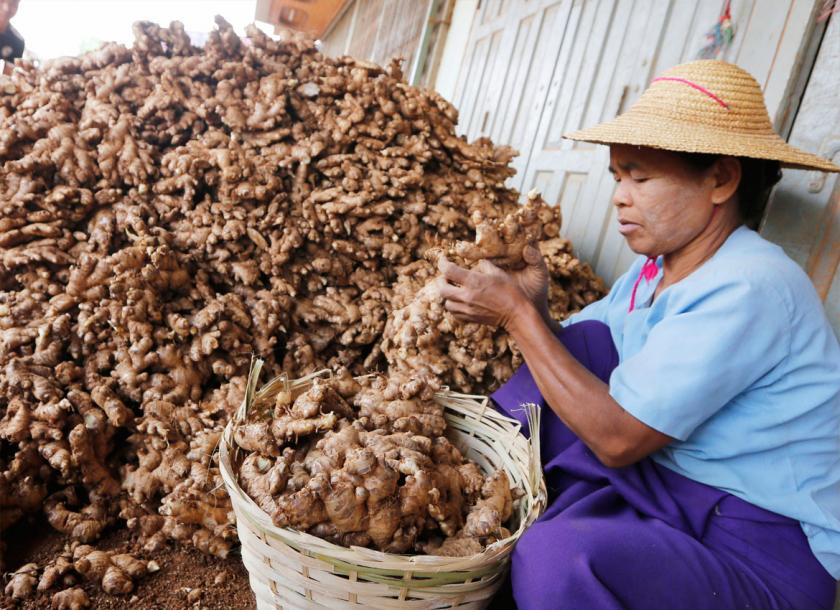Shan State government emphasized on developing agriculture over tourism as it has huge potential to become an agricultural powerhouse in Myanmar and the region
26 ธันวาคม 2562
It’s common to see roads in Shan State full of trucks loaded with vegetables. The state produces 60 percent of all vegetables consumed within the country.
Some of the crops are even exported to neighbouring countries.
The state government now says that it is making moves to place more emphasis on developing agriculture over tourism as Shan has the potential to become an agricultural powerhouse in Myanmar and the region.
“Agriculture is one of the main resources of the state, which has plenty of land and climate that is suitable for various crops. Produce from Shan is sought after in both domestic and overseas markets. All this means there is a lot of potential for investors to explore in Shan’s agriculture sector,” Shan State Minister for Planning and Finance U Soe Nyunt Lwin.
During an investment forum held in Shan State in the last week of November, state officials State focused on inviting local and foreign investors for a single sector – agriculture. This differed from similar events organised by other regions and states that are generally seeking investment in multiple sectors.
Many of the people in Shan rely on agriculture for their livelihoods. Rice, maize, soybean, potato, sugarcane, tea, coffee, mangoes and vegetables are major crops in the state. Rice is the main crop, while maize, soybean, and sugarcane take up much of the land. Portions of the harvests from each crop is also exported to China.
“Much land that is suitable for cultivation remains and the state borders China, Thailand, and Laos. The state is also home to the Muse and Tachileik border trade areas and has moderate levels of water, power, and road infrastructure that can be improved. All this points to a positive landscape for investments in Shan’s agriculture sector,” said Chief Minister U Lin Htut.
According to the state Department of Agriculture’s statistics, there are 2.3 million hectares (5.7million acres) of land suitable for cultivation in the state and only about 800,000 hectares are currently being used. The available land offers good opportunities for foreign and local investors, U Lin Htut said.
“There are huge economic prospects in Shan State’s agriculture. If investors tap this potential sustainably, there will be good outcomes for both the state and investors,” said U Sai Phyo Lwin Oo, secretary of Shan State Chamber of Commerce and Industry (SSSCCI).
Shan State’s highland regions and has cool weather, creating good crop yields and has links by roads to other parts of the country to transport crops internally and also links with border routes for exports. While the state has good prospects there are also challenges, some of which can be overcome with investments, while others might be more difficult to address.
Clashes frequently occur between the Tatmadaw (military) and ethnic armed groups in the northern part of Shan State and peace negotiations have been fitful. Moreover, many farmers in the state still use traditional methods.
“We see that southern Shan State has been developing fast over the last few years while efforts are ongoing to create the China-Myanmar Economic Zones and other economic corridors in the northern part of the state. However, a lasting peace would bring about more lasting development,” U Soe Nyunt Lwin.
The current challenges in the state’s agricultural sector are low efficiency, insufficient data and research, insufficient financing, infrastructure and human resources,” the Shan State Chambers of Commerce and Industry’s said in a report on agricultural development.
Although the State produces and reaps abundant harvests, there are still insufficient supporting services. Storage, packaging, and market connections are the weakest links, said State Investment and Foreign Economic Relations Ministry Permanent Secretary U Aung Naing Oo.
“Market links are weak even to distribute to the domestic market and this kind of space is a good opportunity for foreign investors,” he said.
Currently, some foreign investors have set their eyes on the state as a good environment for agricultural businesses. Germany-based international retail and wholesale company METRO Wholesale has expanded in Shan State to get products directly from farmers and livestock breeders to distribute in other parts of the country. METO has opened a purchasing centre in Aung Pan in Shan State and is making offers to the farmers for various crops.
“We make investments in Shan State and mainland Myanmar. We aim to set up the business depending on the existing resources. We’d like to create a value chain in the country,” said Jens Michel, CEO of METRO Wholesale.
The government of Shan State is planning to carry out a short-term project to develop agriculture, and a long-term investment project to increase investment in the state.
“One of the issues is the market, which is the hardest to achieve. We find difficulties when we sell our products without understanding the market demand. What’s really important is producing and selling what the market demands,” said U Ngwe Tun, founder of Genius Coffee.
The produce of Shan State such as avocado, mango, others are exported to Asian countries, and coffee and tea is exported even to America and European countries.
Although Shan State has good potential for sustainable agricultural development, it still has many challenges to overcome, from production to market development.
Considerable effort will have to be made to see even more trucks carrying agricultural goods running along Shan State’s roads to regional and global markets.– Translated
(The Myanmar Times: https://www.mmtimes.com/news/agriculture-economic-driver.html )











